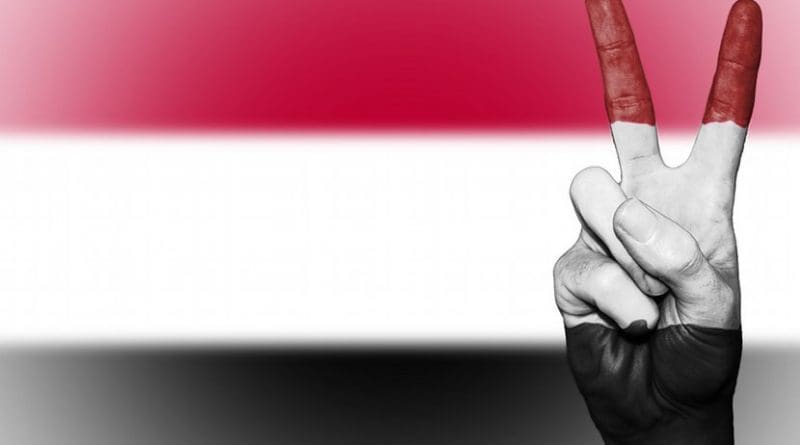Peace In Yemen: It All Depends On The Houthis – Analysis
Yemen has become a vast battlefield, the scene of unending armed conflict. As a result the civilian population is now in the throes of what is universally described as “the world’s worst humanitarian disaster.” On the brink of famine, the nation faces mounting rubbish, failing sewerage and wrecked water supplies, all of which have led to the worst cholera outbreak in recent history. The UN reckons three-quarters of Yemen’s 28 million people need some kind of humanitarian aid.
What has led to this catastrophic state of affairs? Even more relevant, of course, is what can be done to bring it to an end?
On one level, the situation in Yemen is just one instance of the fault line that runs through Islam – the Sunni-Shia divide. The main protagonists are, on the one hand, Saudi Arabia and its eight-nation Sunni Muslim coalition, and on the other, Shi’ite Iran supporting the Shia Muslim Houthi rebels. However historical issues and political considerations complicate the situation, sometimes obscuring, sometimes overriding the religious imperatives.
The Houthis, for example, while certainly on the Shia side of the great Islamic gulf, are in fact a minority group within that Islamic Shi’ite minority. They are Zaydi Shi’ites, or Zaydiyyah, taking their name from Zayd bin Ali, the great grandson of Ali, the Prophet Muhammad’s cousin and son-in-law, and they differ significantly in doctrine and beliefs from the Shi’ites who dominate in Iran.
It was in the ninth century that followers of Zayd established themselves in the mountains of north Yemen. For the next thousand years they fought with varying degrees of success for control of the country. Finally, with the collapse of the Ottoman Empire in 1918, a Zaydi monarchy took power in North Yemen. So there are long-established precedents for the North Yemen Zaydiyyah fighting for control of the country as a whole.
Conflict between North Yemen and Saudi Arabia is also nothing new. The Zaydi monarchy fought and lost a border war with Saudi Arabia in the 1930s, ceding territory to the Saudi state.
In fact, turmoil is the predominant theme of Yemenite history. The monarchy was replaced by a republic, and the republic by a virtual dictatorship under Ali Abdullah Saleh, who ruled Yemen for 33 years, surviving a Saudi-backed civil war in 1994.
But Zaydi resistance continued to smoulder up in the north, and from its midst emerged a charismatic leader named Hussein al Houthi. Soon Zaydis, intent on resisting Saleh and his increasingly corrupt regime, were calling themselves Houthis. In 2004 al-Houthi was killed in one of the Saudi-backed military campaigns launched by Saleh in an attempt to destroy them.
Saleh himself became a victim of the so-called Arab Spring of 2011. Mass popular protests and pressure from neighbouring states forced him to step down in 2012 in favour of his vice-president, Abed Rabbo Mansour Hadi. But Saleh had given up the keys of office with a very bad grace, and was quite prepared to ally himself with his erstwhile enemies, the Houthis, in an attempt to manoeuvre his way back to power. The Yemeni military had remained largely loyal to Saleh, and it was through him that the Houthis gained control of most of Yemen’s fighting force, including its air force. As a result, and supported with military hardware from Iran’s Revolutionary Guards, they overran large tracts of the country, including the capital city, Sana’a.
The subsequent turn of events seems depressingly familiar in the context of Yemen’s long history. Saudi Arabia, determined to prevent Iran from extending its footprint into the Arabian peninsula, intervened in March 2015 to beat back the Houthis. Saudi’s charismatic young Crown Prince, Mohammed bin Salman, assembled a coalition of Arab states, obtained the diplomatic backing of the US, UK, Turkey and Pakistan, and launched a series of air strikes against the rebels.
The unconventional Saleh-Houthi partnership came to an abrupt end on December 2, 2017, when Saleh – a modern manifestation of the Vicar of Bray − went on television to declare that he was splitting from the Houthis and was ready to enter into dialogue with the Saudi-led coalition. This volte-face was to end in tragedy. On December 4, Saleh’s house in Sana’a was besieged by Houthi fighters. Attempting to escape, he was killed.
The Houthis were emboldened. Using Iranian hardware, they started firing ballistic missiles into Saudi Arabia itself. Although responsible for initiating the turmoil, it is not the Houthis but the Saudis and their coalition receiving the world’s opprobrium for the subsequent humanitarian devastation. It is not surprising that Prince Mohammed is said to want to cut his military losses and withdraw from Yemen in exchange for some diplomatic arrangement.
What Yemen needs is a return to a unified structure, democratic elections, and an inclusive government – a process that had actually begun in 2011. So far the Houthis have been reluctant to share power. But the future of Yemen largely depends on them. Do they wish to remain an outlawed militia permanently, or would they prefer to become a legitimate political party, able to contest parliamentary and presidential elections and participate in government?
UN Resolution 2216 aims to establish democracy in a federally united Yemen. Although trenchant in its criticism of the Houthis, it could nevertheless be the basis for a peace initiative. Backed by a UN peace-keeping force, with Iran deterred – by new sanctions if necessary – from sustaining the Houthis, a lasting political deal would involve the end of the Saudi-led military operation, and probably a major financial commitment by Saudi Arabia to fund the rebuilding of the country. Can the enmities of centuries finally be put to one side? Negotiations aimed at a peaceful transition to a political solution for a united Yemen − a long shot, but one eminently worth attempting.

